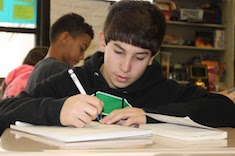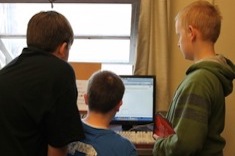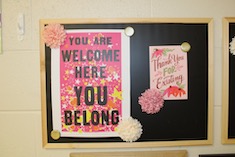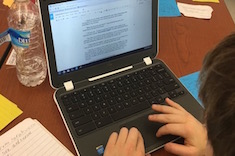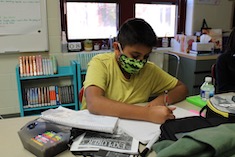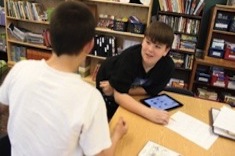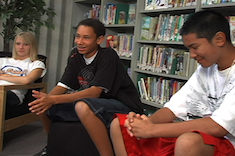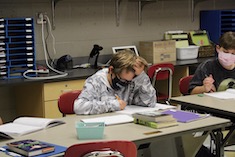Julie Cox
Julie Cox has taught high school English for 17 years and currently serves as a curriculum specialist at Logan County High School in Kentucky. She loves helping students see how books and writing help them connect all the pieces of their education.
Latest Content
Literacy Skills in All Content Areas
Julie Cox reminds us that each content area is full of opportunities for students to give shape to their ideas in all kinds of ways that don’t look like traditional essays but still help them develop their literacy skills.
Considerations for AI in the Classroom
Julie Cox wrestles with the use of AI to support high school writers. In this article she offers filters for educators to determine the role of AI in their classrooms.
Stay Curious
Inspired by Ted Lasso’s mantra, “Stay curious, not judgmental,” Julie Cox provides three questions she asks herself and students to remain innovative.
Increasing Student Choice
We want students to be lifelong learners, eager to grow, and equipped to face challenges. For this to happen, we have to let the classroom be a place that reflects these qualities. Julie Cox offers three innovative ways to leave choice in the hands of students. In turn, they learn to trust themselves and their learning, and believe that they are capable of finding answers.
Dealing with Overwhelm
Julie Cox offers three actionable ideas to fight frustration and take small steps to beat overwhelm.
Author Moves: More Than “Lots of Detail”
Julie Cox deconstructs craft moves—literally and figuratively—with her high school writers. If you are looking to move conversations about craft beyond “The author used a lot of good details,” then you’ll want to try Julie’s suggestions.
Putting Together the Pieces of a Classroom (Classroom Organization)
When Julie Cox moves into a smaller classroom, she realizes that to make it a room where students learn and thrive, she needs to shift her mindset. Rather than simply putting things where they fit, she asks three questions to make intentional decisions that will support learning.
Authentic Audience
Julie Cox offers three questions to determine authentic audiences for high school students to share work.
Rural Communities
Julie Cox explores the differences in her experiences of teaching in the city of Louisville and teaching in a rural community. All teens have similar universal experiences, yet Julie outlines some considerations for rural students.
Take a Chance
Julie Cox invites us to take risks in order to encourage students to try new things with their writing and reading. Julie concludes that when teachers are professional risk-takers, we are more available to students and know how to help them when they fail.
Keeping Unity
When students feel safe, they are positioned to learn. Julie Cox shares ways to create a learning environment that brings unity to her high school classroom.
Grow and Innovate with Reflection
Julie Cox makes a case for reflection as an essential tool for growth and innovations. She shares simple and powerful steps that will allow all educators to continue to deepen their instructional practices.
Writers’ Club
In her high school writing workshop, Julie Cox noticed that students wrote eagerly, but struggled to give and accept feedback. To increase student ownership and trust, she started Writers’ Club, and it affected transfer of learning in big ways!
Overcoming: Helping Students Process Covid Feelings
Julie Cox reminds us that for many students, the loneliness and fear of COVID years clings like smoke, and they don’t always have the language to talk about it. While we have worked hard at helping students reclaim content knowledge, we must also help them express and process feelings they might not know how to recognize.
Browse Content By
Type
Category
- Assessment Tools
- Big Fresh Archives
- Booklists
- Choice Numeracy
- Classroom Design
- Common Core
- Community Building
- Conferring
- Content Literacy
- Digital Literacy
- English Language Learners
- Equity
- Family Relations
- Free Samples
- Guiding Groups
- Leadership
- Literacy Coaches
- Mentor Texts
- Minilessons
- New Teacher Mentors
- Podcasts
- Poetry
- Quote Collections
- Reading Strategies
- Self Care
- Struggling and Striving Learners
- Talking and Listening
- Teacher Study Groups
- Teaching Reading
- Teaching Writing
- Word Study and Vocabulary
Author
- Melissa Quimby
- Nawal Qarooni
- Gwen Blumberg
- Julie Cox
- The Lead Learners
- Hannah Tills
- Josie Stewart
- Ruth Metcalfe
- Mallory Messenger
- Becca Burk
- Jodie Bailey
- Vivian Chen
- Mary Brower
- Tiffany Abbott Fuller
- Stephanie Affinito
- Ruth Ayres
- Leigh Anne Eck
- Heather Fisher
- Shari Frost
- Julie Johnson
- Suzy Kaback
- Gigi McAllister
- Shirl McPhillips
- Melanie Meehan
- Cathy Mere
- Debbie Miller
- Tara Barnett and Kate Mills
- Tammy Mulligan
- Dana Murphy
- Bitsy Parks
- David Pittman
- Brenda Power
- Heather Rader
- Matt Renwick
- Mandy Robek
- Christy Rush-Levine
- Gretchen Schroeder
- Jen Schwanke
- Brian Sepe
- Katherine Sokolowski
- Stella Villalba
- Jennifer Vincent
Grade Level
Choice Literacy Membership
Articles
Get full access to all Choice Literacy article content
Videos
Get full access to all Choice Literacy video content
Courses
Access Choice Literacy course curriculum and training

